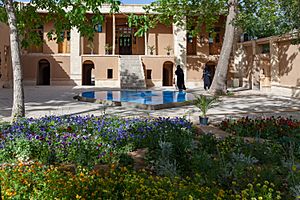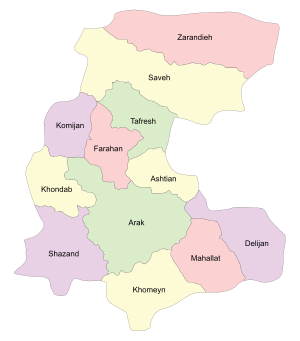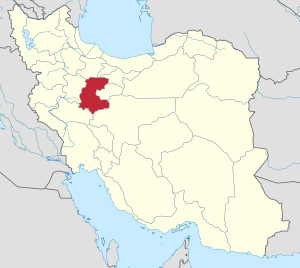Khomeyn County facts for kids
Quick facts for kids
Khomeyn County
شهرستان خمین
|
|
|---|---|
|
County
|
|

The birthplace of Ruhollah Khomeini in Khomeyn
|
|

Location of Khomeyn County in Markazi province (bottom, yellow)
|
|

Location of Markazi province in Iran
|
|
| Country | Iran |
| Province | Markazi |
| Capital | Khomeyn |
| Districts | Central, Kamareh |
| Population
(2016)
|
|
| • Total | 105,017 |
| Time zone | UTC+3:30 (IRST) |
| • Summer (DST) | UTC+4:30 (IRDT) |
| Khomeyn County can be found at GEOnet Names Server, at this link, by opening the Advanced Search box, entering "9207301" in the "Unique Feature Id" form, and clicking on "Search Database". | |
Khomeyn County (Persian: شهرستان خمین) is a region in Markazi Province, Iran. The main city and capital of the county is called Khomeyn. In 2016, about 105,017 people lived in Khomeyn County. This number was slightly higher in earlier years, like 108,840 people in 2006.
Khomeyn County is located in the southern part of Markazi Province. It sits on a rich, flat area of land. The weather here is a mix of mountain climate and semi-desert. This means winters are cold, and summers are mild. The county is about 323 kilometers (200 miles) away from Tehran, the capital city of Iran.
The name "Khomeyn" was first written down in an old book called The History of Prophets and Kings. There are also very old structures in the area, like underground water channels called qanats, old sewers, and a famous fire-temple. These show that people lived here long before Islam. About 200 years ago, this area was known as the center of Kamareh. Today, Khomeyn County is well-known as the birthplace of Ruhollah Khomeini, who was an important leader of the Islamic Revolution in Iran. His childhood home is now a historical site that many people visit.
How Khomeyn County is Organized
Khomeyn County is divided into smaller areas to help manage it. These areas include different districts and cities. Over the years, the number of people living in these areas has changed.
Here's a simple look at the main parts of Khomeyn County and how their populations changed:
- The Central District is the largest part. Its population was around 94,109 people in 2016.
- Inside the Central District, there are several rural areas (like countryside villages) such as Ashna Khvor, Galehzan, Hamzehlu, Rostaq, and Salehan.
- The city of Khomeyn itself is also in the Central District. In 2016, about 72,882 people lived in Khomeyn city.
- The Kamareh District is another part of the county. Its population was about 10,908 people in 2016.
- Kamareh District also has rural areas like Chahar Cheshmeh and Khorram Dasht.
- The city of Qurchi Bashi is located in the Kamareh District. Its population was around 1,374 people in 2016.
Ancient Discoveries in Khomeyn
Archaeologists have found interesting things in Khomeyn County! In 2017 and 2018, a special rock carving was discovered at a place called Teimareh. This carving shows a six-legged insect called a mantis, specifically an Empusa hedenborgii. It has strong front legs, like a praying mantis.
This insect carving is about 14 centimeters long and 11 centimeters wide. It also has two circles on its sides. Experts believe this carving could be very old, possibly made between 4,000 and 40,000 years ago! This type of insect carving is similar to other ancient rock carvings found around the world, sometimes called the "squatter man" petroglyph. These discoveries help us learn about the ancient history and art of the region.
See also
 In Spanish: Condado de Jomein para niños
In Spanish: Condado de Jomein para niños
 | Sharif Bey |
 | Hale Woodruff |
 | Richmond Barthé |
 | Purvis Young |

